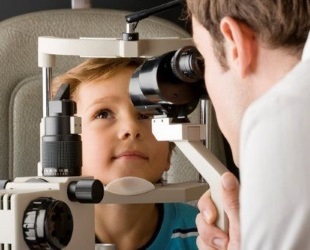
The frequency of eye blinking in a healthy body is determined by the need to moisturize the eye shell and supply it with oxygen.
But sometimes a person can blink with too much periodicity, and this phenomenon is more common in children.
It can indicate both neurological disorders and problems with the eyes themselves.
In the article we will discuss this issue in detail and offer tips that help get rid of frequent blinking.
Reasons for
Frequent blinking of two kinds of causes: ophthalmic and neurological. First, we'll deal with the first.
Ophthalmic
Blinking can increase if normal periodicity is not enough to maintain a comfortable functioning of the eyes.
The reason for this may be:
- Dehydration. If the skin of the eye dries out too quickly, it often requires blinking to moisten it.
- Decreased visual acuity. If you do not wear glasses and do not make corrections in such a violation, your eyes will have to strain for the examination of objects, and if you overstrain the eye needs oxygen and moisture more than in the normal state.
- One of the main reasons for dryness in the eyes is a long work at the computer. However, during operation, the eye blinks less often than usual, but immediately after it is completed, it restores the water balance with rapid blinking.
- Contact with eyes of foreign body, especially when it falls into the depth of the conjunctival sac.
- Conjunctivitis. Swelling of the tissues around the eye leads to irritation, from which he tries to get rid of rapid blinking.
- Other infectious lesions of the eye, such as blepharitis.
Neurological

There are a number of neurological and psychological disorders that provoke rapid blinking even with completely healthy eyes.
This is due to the fact that blinking is an unconscious process that depends on the work of the entire nervous system.
Therefore, problems with its functioning can affect the work of the organs of vision. Among these problems are:
- Craniocerebral injuries. Experiences, stressful situations. In children, they can be caused by excessively strict upbringing, difficulties in communicating with peers, problems with study, etc.
- Load on the nervous system due to colds, especially in children under 6-7 years old.
- Use of certain drugs that excite the nervous system, for example, nootropics.
- Predisposition to epileptic seizures.
- Parkinson's disease.
It should be noted that blinking with neurological problems most often accompanies the common nerve tic, which is manifested in the distortion of the facial muscles, limbs.
Such tics can be a syndrome of brain damage or neural canals, or may be a consequence of a genetic predisposition. Especially often they occur in children with attention deficit disorder.
They can be provoked by vitamin deficiency, since with a lack of certain substances( zinc, magnesium), the nervous system starts to work incorrectly.
Symptoms of
Blinking, which is a symptom of any pathology, differs in that it does not last for a few seconds or minutes, but pursues the child for days and months, becomes familiar to him.
Its frequency changes from the optimal time in a few seconds to once every two seconds, and in some cases it can occur more often.
The longest such an impairment of the eyelid is observed with neurological disruptions, but problems such as a deep-seated foreign body or a decrease in visual acuity without the appointment of glasses may be accompanied by long-term blinking.
To distinguish the psychological causes from ophthalmic can be by the fact that in the first case will twitch not only the muscles of the eye, but also the face, and sometimes hands with legs.

Only one eye can blink. This indicates the damage to the nerve channels leading to the muscles of the eye, as well as problems with the area of the brain that is responsible for the operation of one of the hemispheres.
Ophthalmic causes, such as ingress of foreign objects, infection and the occurrence of inflammation, remain relevant in this case.
For full-fledged diagnostics it is necessary to pay a visit to the ophthalmologist and neurologist. An ophthalmologist will check his eyes for infections, foreign bodies, dehydration. He will also check the child's vision to reduce its severity.
If none of the diagnoses is confirmed, it is more likely to indicate the presence of neurological problems, and you will have to go to a neurologist. It will not be superfluous to visit the psychotherapist, who will check the child for stress.
Caring for children's eyes is particularly trepid. The following collection of articles will help to preserve the eyesight of the child:
- Interesting charging for the eyes
- Prevention of visual impairment
- How to maintain vision when working on a computer
Treatment

Therapy depends on the established cause. If blinking occurs due to overwork, then you need to give your eyes more rest.
If the cause is dehydration of the shell, then it is necessary to reduce the time of the child's stay at the computer and in front of the TV and apply moisturizing drops( artificial tear, Oftagel, Systemin-ultra) to the eyes.
Consumption of caffeinated beverages is excluded. Infectious diseases are treated with antiviral and antibacterial drops.
Elimination of neurological problems involves the prescription of the doctor tablets, normalizing the work of the nervous system. But drug treatment in such cases should be an extreme measure.
Often enough, normal auto-training is enough. Calm your child, help him cope with stress, lead to a good psychologist, reduce the requirements for work at home.
To cope with blinking will help and folk remedies. The recipe for a soothing decoction: 2 tablespoons of mint, a tablespoon of valerian and three tablespoons of chamomile are mixed in a glass, pour boiling water for half an hour and drink twice a day.
You can make a pillow of herbs, it will provide the child with a healthy sleep and a quiet awakening. Rinse the eye when foreign bodies get into the broth of black tea: you need to brew it in a large consistency, allow it to cool and apply to a damaged eye with a cotton swab.
Preventive measures consist in strengthening immunity, preventing stressful situations, reducing the time spent working at the computer, correct the regime of the day, and refraining from consuming drugs that negatively affect the nervous system.
Prevent dehydration of eyes in your child, and at the first signs of dryness, let him rest and drip moisturizers.
Results of

Frequent blinking of eyes in children is caused by problems with the eyes and the nervous system. Ophthalmic problems are represented by dehydration of the eyes, overexertion, conjunctivitis, infectious diseases.
Stresses, the consumption of drugs that excite the nervous system, damage to nerve endings, excessive mental stress on the body - these factors can also cause rapid blinking.
As a rule, to eliminate such trouble, you do not need to consume medicines and medical intervention, just the correct regime of the day and increase the rest time, as well as getting rid of conditions that cause stress.
Useful video
This material may help you:
Interesting game for children
It is known that it is easier for a child to be interested in something than to force him to do things that he does not want. So, for training the eyes and preserving their health, you can play with the child in the game: give him a stereo picture, if he guesses what is painted on it, he will receive some prize. These images look like this:

